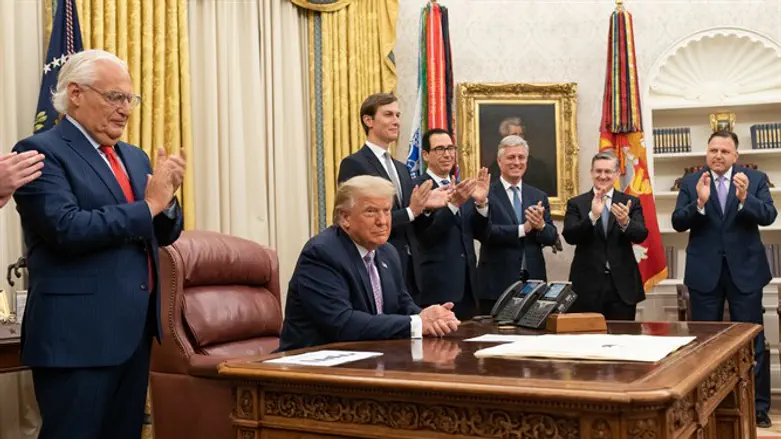
(JNS) One of the main achievements of the Abraham Accords—which normalized diplomatic relations between Israel and the United Arab Emirates and Bahrain—is their very name. After losing hope of defeating Israel on the battlefield, Israel’s enemies focused on creating an anti-Israel narrative. Their ambition was to erase all of Zionism’s intellectual foundations—distort history, negate the legitimacy of the Bible and paint Israel as an evil state, certainly not as a state seeking to promote progress and good in the region.
One of the primary avenues of this narrative-based attack is “occupation”—a buzzword that the State of Israel has been most identified with by international organizations and media outlets across the globe. This nefarious term, “Israeli occupation,” implies all that Israel’s enemies wish to convey: that Israel is a colony of the “white man” in the heart of the Middle East, a European foothold, a foreign entity seizing Arab lands and violating the human rights of the natives, the original people of the land: Palestinian Arabs.
How does one fight this? How do we express the Jewish people’s deeply-rooted connection to this land, which is the backbone of the State of Israel, and undo the image of the heartless occupier? The answer to this question lies in this new treaty, and is predicated upon a single word: “Abraham.”
US Vice President Mike Pence visited Israel in January 2018 and spoke to the Knesset. In that speech, he elucidated the importance of Abraham: “Nearly 4,000 years ago, a man left his home in Ur of the Chaldeans to travel here, to Israel. He ruled no empire, he wore no crown, he commanded no armies, he performed no miracles, delivered no prophecies, yet to him was promised ‘descendants as numerous as the stars in the sky.’
“Today, Jews, Christians and Muslims—more than half the population of the Earth, and nearly all the people of the Middle East—claim Abraham as their forefather in faith,” he said.
It’s evident, then, that the phrase “Abraham Accords” denotes that the treaty was forged by the descendants of Abraham’s children—Arabs and Jews—and thus redefines Jewish presence in the region as ancient and therefore legitimate. This runs exactly counter to the “occupation” narrative. It also appears the UAE has adopted the figure of Abraham as a unifying element in the region. In Abu Dhabi, construction has already begun on a magnificent inter-faith complex named the Abrahamic Family House, which will consist of three main buildings—a mosque, church and synagogue—for the purpose of invoking peace and coexistence among the three Abrahamic faiths: Christianity, Islam and Judaism.
The UAE has a very strong interest in comprehensive normalization with Israel, starting with the common threat posed by Iran, to its desire for prosperity and progress. The “Abraham Accords” brand is important to the Emirati people as well, as it provides Muslims a type of religious license to reach out to the Jewish state.
We should not be surprised, however, that certain elements oppose normalization. The Palestinian Authority, for example, is outraged. Its life’s mission is to negate Israel’s right to exist and entrench the term “occupation” in regular discourse. Other elements with a hostile approach to Israel, among them Hamas, Hezbollah, Turkey and Iran, all work tirelessly to invalidate the Israeli narrative—ultimately laying the groundwork for destroying the Jewish state.
Yet a new spirit of regional cooperation is spreading its wings across the Middle East, as evidenced by the Abraham Accords, which promise diplomatic, security and economic relations between the UAE and Israel. Let’s hope this new treaty causes a groundswell that pushes the Arab world away from hate and toward acceptance of Israel as an esteemed member of the Semitic family and member tribe of the region.
Yishai Fleisher is the International Spokesman for the Jewish Community of Hebron and an Israeli broadcaster. Follow @YishaiFleisher.
This article first appeared in Israel Hayom.
